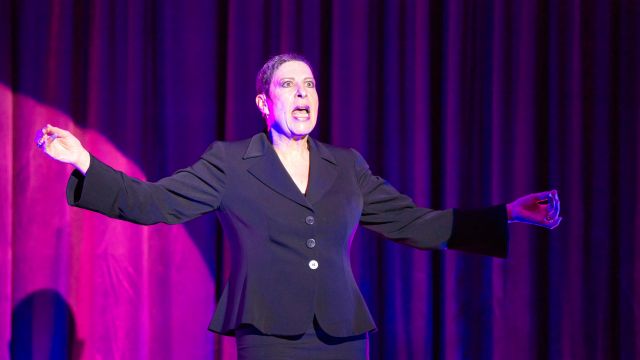Shrapnel
The thread that runs all through Shrapnel, Natalie Gamsu’s one-woman show, is frustrated regret that she is not Spanish. Every now and again, she exhibits a flamboyant flamenco dancer gesture, contrasting that with the far tamer expressions of esprit, emotion and identity that she feels have been forced upon her. Sephardi Jews were expelled from Spain at the end of the fifteenth century and became part of the scattered diaspora. Long, long before Gamu’s birth of course, but she knows. For her ancestors, it meant migration and ending up in the Pale of Settlement, in a little shtetl, where life was bleak and repressive, so different to the heat and passion of Spain…
Gamsu’s show is a charged, fierce, barbed, funny, ironic – and of course selective – telling of her life. Alone on stage – but for pianist Mark Jones – Gamsu is all in black. She dominates the bare space and commands – no, compels - our concentration. She succeeds in that: our attention never wavers for well over an hour.
Not for her the self-deprecating, please-like-me, everyday anecdotes of the standard stand-up comic. Anyway, this isn’t stand-up; this is epic, with an historical sweep, often challenging, sometimes not very nice, but enlivened and made piquant by descent into the intimate details of family conflict - especially between Gamsu and her Mother, who is outwardly timid, conformist but anxious and endlessly, negatively critical. Much conflict stems from the issue of Gamsu’s weight and her corresponding need to defy and to comfort herself – so she eats – and eats. She admits it: she was huge. And that’s ironic because now, as she stands before us, she’s a tall, strong, semi-Amazonian figure with whom you would not wish to argue.
She begins her show with a dramatic kind of catalogue song that lists almost all the major cities of the world – and she has, by the way, performed in most of them and her experience shows. But it’s a sombre song of relentless movement and cities fly by, dots on a map. The song sets up her theme of movement, of setting up anew in a different place with its own constraints and mores. Sadly, there are only two more songs in the show – an interpolation and a finale. Mark Jones sits utterly still in the shadows at the piano which becomes almost disconcerting – or would but for Gamsu’s unwavering performance, enhanced (if enhancing were needed) by Sidney Younger’s subtle lighting changes.
Gamsu asks implicitly how one maintains a sense of self, of identity as one moves, or flees, or migrates and then fits in. How does one define oneself? The task is all the more difficult if one feels in one’s heart that one is really Spanish.
After the shtetel, South Africa… More rules, more strictures, more struggle to be oneself – or to discover what that self is or might be - and too bad it’s not Spanish - but breaking away, becoming what she has become.
Then in Australia, accompanied now by the rather shadowy figure of husband Julian. But what is quite astonishing is the way Gamsu grips us as she brings into her narrative the vast array of other characters in her life with such economy and precision. A different voice. A flicker of facial expression. And it’s not just these others she encounters, but she gives us herself too as a child, as the overweight teenager, as the fledging performer making her way… And then there’s the crucial character of her mother whom Gamsu depicts as the critical, nagging, anxious Jewish Mama and all the way through to the frail old girl losing her mind and telling Gamsu – finally – that she is ‘beautiful’.
She is scathing about her honeymoon trip to the Australian Blue Mountains towns of Katoomba and Leura and their tourist attractions – all beige and small. And, yes, by contrast to all she’s seen and done, small and beige does seem right… But Julian appreciates her: he asks her was she a flamenco dancer in a previous life. Oh, how she loves that – and him for saying so.
We can only guess at – or infer – Ash Flanders’ contribution to Gamsu’s text, this account of her life. Some tightening or selecting, some restructure? Plus Flanders’ characteristic subversive edge? Likewise what of the co-direction of Flanders and Stephen Nicolazzo. Does Gamsu need two directors, or even one? Perhaps they helped to bring that array of vivid characters into the story.
Michael Brindley
Photographer: Tuvya Garfinkael
Subscribe to our E-Newsletter, buy our latest print edition or find a Performing Arts book at Book Nook.

